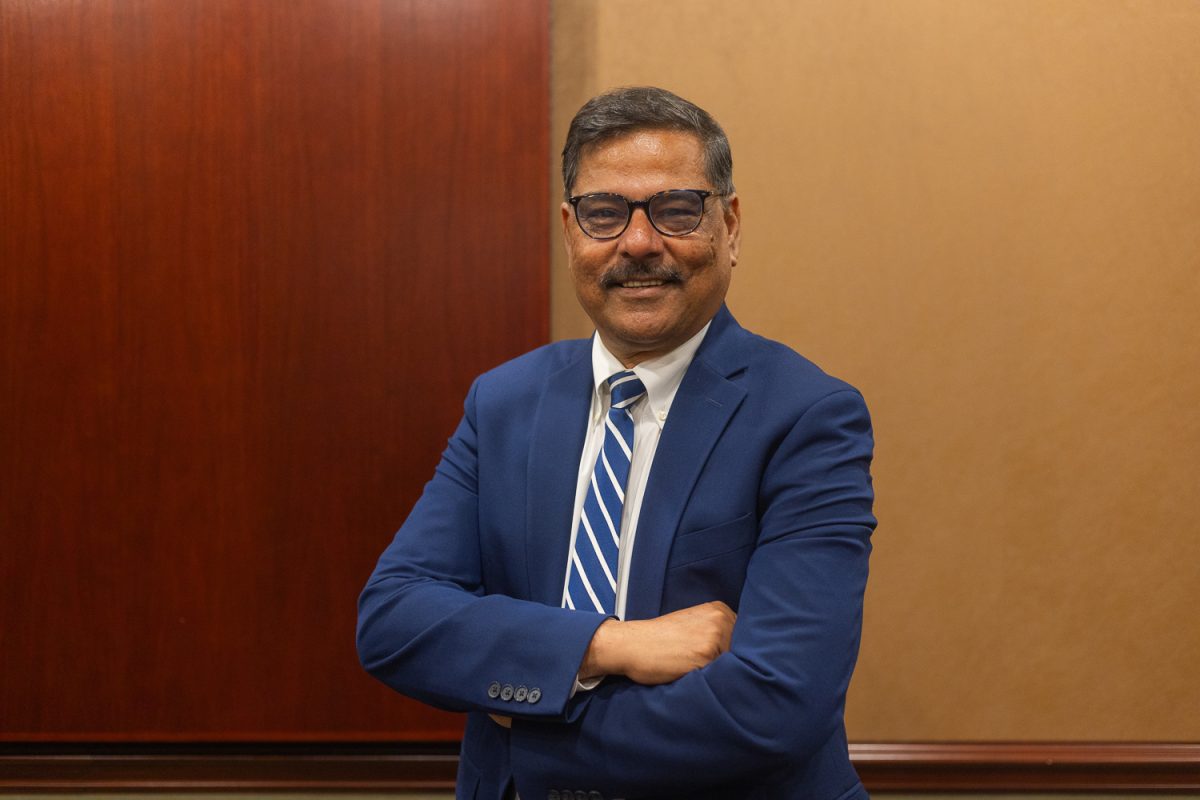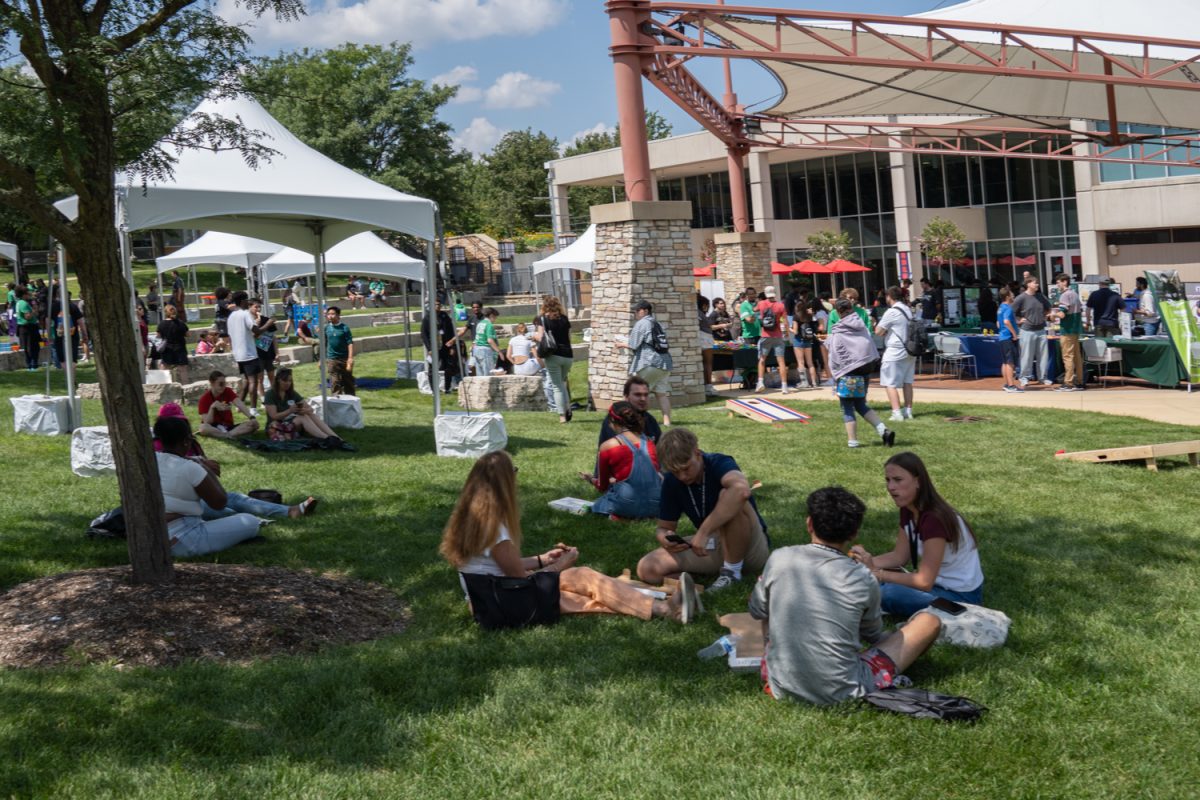When I walked into his conference room on July 17, I was greeted with a warm handshake from Muddassir Siddiqi, the newly appointed eighth president of College of DuPage (COD). He immediately smiled and expressed his enthusiasm about engaging with students. Throughout our conversation, his deep knowledge of higher education leadership and commitment to the community were evident. With a background that spans academia and the private sector, Siddiqi brings a wealth of experience to his new role leading COD into its next chapter.
Catherine Crousore: You’ve officially stepped into your role as COD’s eighth president on July 1. Congratulations and welcome! What were your first impressions of the college and the community?
Muddassir Siddiqi: You know, it has been a wonderful experience, and COD is not a new place for me. Some of you may know that I attended a class here, my three sons attended COD. Several other relatives, like my brother and his kids, attended COD. So this is a long-term relationship. That’s why COD is very close to my heart. I used to live in this area before I moved to Houston in 2017, so I’m very familiar with the community, and familiar with the college, and the tremendous reputation it has in the region.
As far as my experience, I started July 1, and I can tell you every day I learn something exciting. I learn more about student success here, our programs, the faculty members and staff members who are committed to student services. I would say that every day I get more and more excitement. It’s a wonderful experience.
CC: Your professional path includes both corporate and higher education leadership across multiple states. What drew you to COD at this point in your career?
MS: There was always a desire to come back home. I worked in Houston, which is a huge city. I was fortunate to serve a very diverse community, with people from different backgrounds, students with different levels of preparation, and different motivations or reasons to come to the college, whether that be part-time or full-time. I think I served that community very well, and the time came, and there was a desire to go back home, back to my roots. Me and my family, as I mentioned before, have many friends here. We’ve been a part of different civic clubs here, so of course there was a desire to come back. Another reason is because this is not just another job for me, it’s another chapter of my mission to help support students and help others.
CC: You’ve spoken about how COD is a “national leader among community colleges.” What qualities do you think set COD apart, and where do you hope to take it next?
MS: I think one of the things that comes to mind right now are the programs. The academic programs, and when I use the word ‘academic’ programs, I mean both general education programs, workforce programs, and continuing education programs. COD is a comprehensive community college, as we have transfer programs, workforce programs, continuing ed., short-term programs. We serve the local employers very well, and we are very connected. I have never heard anything from any employer, because I used to live here and I served as a provost and a president at other community colleges in Illinois, I’ve never heard anything that has sparked my attention as much until now. I think COD is well placed because of the size of its impact, you know we serve thousands of students every year. The faculty members, who we are very lucky to have the best of class faculty on our campus, and staff. Most of the resources you can imagine needing as a community college student we have here.
CC: During your leadership positions, you focused heavily on innovation, artificial intelligence, and immersive learning. How do you see up-and-coming technology playing a role at COD?
MS: I spent the last two years more intensely in artificial intelligence, the metaverse and immersive learning three-dimension, and these are all hard terms, but that has not been my core focus. My core focus is enhancing student experience at a college, which means when you start your journey as a prospective student, to graduation. That has been my focus for the last 20-plus years. I have been deeply engaged in conversation with my peers, legislators at the international level, the local level, about how to improve our resources and resource base to provide more support to our students. That has been my focus, so these technology things have been about 3% of my total work, but because we’re in the 21st century, everyone talks about AI, so some of these features pop out more. I believe that technology is changing a lot of different things as we know it. I can imagine waking up this morning, and I check my email first. Then I respond to some text messages, then I put in the address of the destination that I want to go using Google Maps, and then I mobile order my Starbucks, then put my map from there to the COD. You can already see my reliance and dependence on my cell phone, which is technology or AI. So artificial intelligence and these technologies are shaping our lives, and for us, as a community college, is how they’re shaping the job market. How can we prepare our students in an AI led market? So this is a collaboration between faculty, staff, administration, tech companies, etcetera.
When I was in Houston, I had an excellent opportunity working with faculty and tech companies to bring resources to students from companies like Johnson Controls and Simmons. We’ve partnered with Intel, and we launched the first program in artificial intelligence, a baccalaureate degree. It is just to prepare students in response to the market.
CC: Do you think that’s going to impact some of the policies here at COD regarding AI and different technologies?
MS: What we actually teach in the classroom, the faculty here knows better than anybody else, right? This is their choice, what kind of technologies, and what they think is best for their students. So we are here to provide any resource, if it comes from the faculty and staff. However, there are some low-hanging fruits, especially about processes, which are meant to provide services to students and also our staff members. Staff, faculty, all of us. For example, if I submit my requisition for buying some stuff, I want to get a response pretty quickly. I want to get the stuff that is in the budget pretty quickly. I don’t want to wait 25 days. So these are the potential areas that I would say on the administrative side where these new technologies can expedite the processes, so there will be less frustration for students and less frustration for employees at COD. That would be the starting point, looking into technology integration, like AI in our business atmospheric processes, I would say.
CC: Equity and access have been central to your work throughout your career. How will those values shape your presidency here at COD?
MS: Let me share my story. As an immigrant, I fully understand the challenges that immigrants experience here. I see diversity as one of the key values of higher education. Because we can acknowledge and learn about things and in order to enrich our learning, we need to rely on multiple perspectives, which cannot be possible without having diverse people in the room. But diversity is not enough. Having people is not enough. Having people on the seat and decision-making is the goal, which is inclusion. At community colleges, we have students from all different backgrounds, first-generation students, undocumented students, students from underprivileged environments, women, students with some kinds of disabilities, veterans who serve for us. Our mission is to provide them access, but not only access. It’s not enough. Success is the goal. What kinds of conditions can we create to make them successful at COD? What kind of resources can we provide? What kinds of information is shared with them to make them a successful graduate? To develop them not only for their career, but as a citizen and a whole person. When they leave COD, they are not only a graduate who is ready for a job, but an engaged citizen who is ready to participate in our democracy.
CC: Some faculty we’ve talked to mentioned they would like to see the number of full-time faculty increase. Is that something you are looking to address during your tenure?
MS: I will definitely look into this. I think having full-time faculty members is always helpful because they participate in not only teaching but also in different activities. They serve on committees, they share government structure, they participate in college events, and they have established office hours. Full-time faculty members are critical in the success of any college, not only COD. Our adjunct faculty members are equally as important. Their job requirements are a little different, but it is always critical to keep a fine balance between the two. But I agree with you, in order to have robustness or vitality of the programs, we need full-time faculty members.
CC: Earlier this year, the classified staff set to unionize. What are your thoughts on this growing union?
MS: As a new person, I do not know much about it yet. However, in principle, I support this movement. This is their right to go for collective bargaining. This is one of the ways to represent their members. One voice. We just want to make sure that all of us employees are flourishing, and that every voice is heard. We want every person to feel that he or she has some sort of impact on the college. Every employee at COD has a direct or indirect impact on the college and what we do on a daily basis. I appreciate the classified members of staff, and I want to have a very supportive environment for all.
CC: What does “student success” look like to you? How can students expect to see that reflected here at COD?
MS: There are multiple ways to define student success. In my opinion, student success is the success of a student as a whole. Not only for career and professional development, but also as a citizen. Different students come to a community college for different reasons. As you know, some students come to complete a certificate program, and some of you want to go to four-year universities. We also have hundreds and thousands of students in continuing ed., who just want to gain some skills for the job market or come to the college for different courses. This morning, I went to the Homeland Security building, and I was so amazed at the job that they have been doing. What I learned was that in one semester, 40 hours in total, they prepare 9-1-1 operators. These students are ready for Illinois certification, and they can join law enforcement agencies pretty quickly. So some people come in for this particular reason. We are here for all kinds of students, so their success is determined by how your expectations are fulfilled.
CC: As you begin this new chapter here at COD, what message would you like to share with students and staff as their new president?
MS: You picked COD, and I think that is one of the best decisions in your career. COD is the right place for you. COD offers a variety of services and programs, so please tap into those opportunities. Talk to your advisors. Talk to your faculty members. These people are eager to help support you. You are in the right place.









